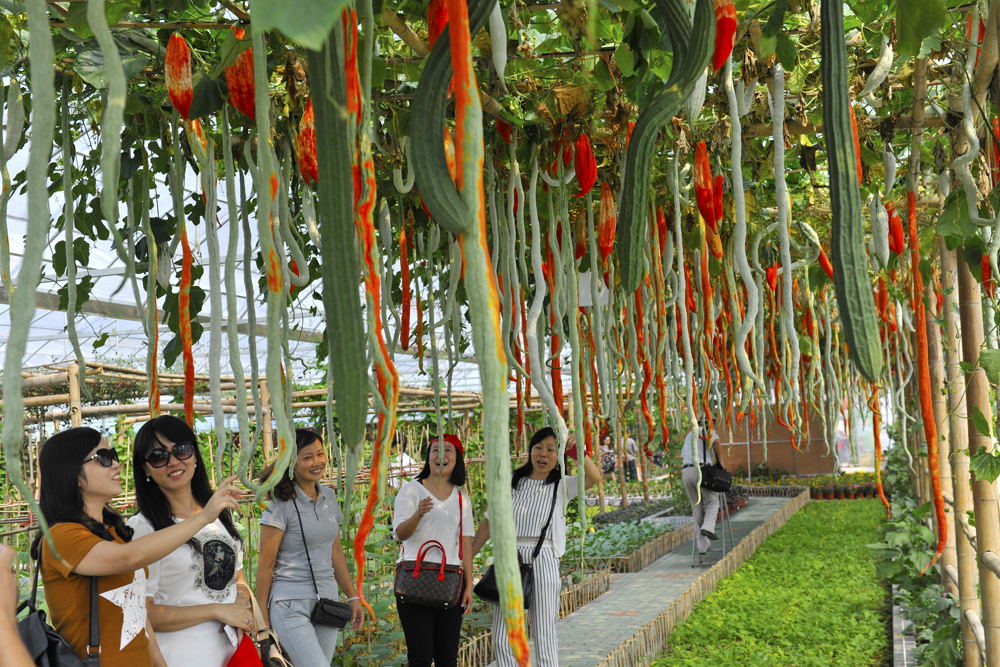Tourism breathes life into mountain
Living in a remote mountainous village of Hubei province and trapped in poverty for decades, Liu Wencai found a way to improve his livelihood after his village began welcoming tourists.
By LIU KUN in Wuhan and ZHAO RUIXUE in Jinan | China Daily | Updated: 2019-10-17 09:42

Better infrastructure, neat environment bring in visitors, create jobs for locals
Editor's Note: Oct 17 is China's National Poverty Relief Day. China Daily explores four examples of success stories from around the country.
Living in a remote mountainous village of Hubei province and trapped in poverty for decades, Liu Wencai found a way to improve his livelihood after his village began welcoming tourists.
Liu, 44, now works as a patrolman for Longfeng Agriculture Development Group. His wife works as a cleaner for the company. Together they make a stable income of 4,000 yuan ($564) per month.
Based in the Longfeng mountainous area of Daye, Hubei province, the company integrates local agricultural resources and infrastructure to attract tourists.
It has provided steady jobs for 380 locals, including Liu and his wife, and offers thousands of seasonal jobs.
According to the company, more than 3,000 residents have escaped poverty by working at projects developed by the company.
A decade ago, the mountains in Longfeng were bare and the surrounding villages were plagued by garbage and sewage. Now, the mountain ranges are green with twisting roads running through them, while trash cans and toilets keep the villages neat.
The area attracted 800,000 tourists last year, generating 130 million yuan in revenue, the company said.
"The tourism industry has proved to be an efficient way to boost economic development and help alleviate poverty, especially in central and western provinces," said Zhang Yuan, director of the general services office of the World Tourism Alliance.
Last year, the tourism industry contributed 9.94 trillion yuan to the economy in China, accounting for 11 percent of national GDP, according to a report released by the Ministry of Culture and Tourism in February.
Nearly 80 million people were employed in the industry, accounting for 10.3 percent of the working population, according to the report.
"Sound tourism projects coordinate the interests of the tourism industry, poverty relief work and environmental protection to ensure the sustainable development of the rural areas," Zhang said.
He also cited a report released by the State Council Leading Group Office of Poverty Alleviation and Development in 2017 that said more than 10 million people have been lifted from poverty since 2011 because of the booming tourism market in rural regions, accounting for over 10 percent of the population suffering from poverty in China.
The report forecast that by 2020 the tourism industry will have helped 12 million people in impoverished regions shake off poverty.
Along with the tremendous improvements in people's livelihood from the booming tourism industry, residents in once poverty-stricken rural regions have also witnessed an improved environment.
In addition, tourism-driven poverty alleviation work could protect traditional cultures, especially the intangible cultural heritages that are usually ignored due to weak financial underpinnings, said Peng Wei, deputy head of the Rural Economy Research Center of Hubei Academy of Social Sciences.
Specialty products with distinctive characteristics can boost business and attract more tourists, encouraging residents to retain more cultural traditions, she said, adding that rural tourism has become a strong and sustainable force helping villagers get out of poverty.
























